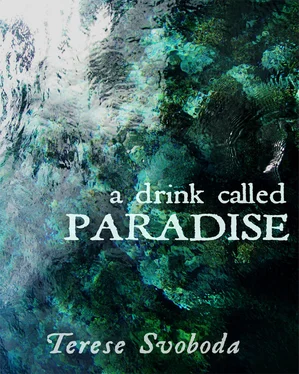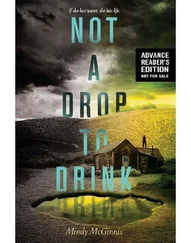No.
Okay. So who is in charge? I ask.
She leans on the railing, leans as if this is why they’re installed, not to keep people in but to let them lean. Below, she signals with a hand off that railing. He hardly ever comes up, not even at night. He could be in Bellevue instead of the ocean, he could be in Persia, he’s a thousand-and-one-nights kind of guy. He’s the one.
She’s maybe more drunk than I am.
It was an accident, you know, she says.
I know what an accident is, I say.
The captain will like my story about the island, I say. In my story, children hide under it as if it were just a spoon to be overturned. But instead of being served up in a mouthful, they come up through the sand as jelly.
I stop, I go on. The important part of the story is why they are hiding.
They should hide, she says at last.
No — not children, they shouldn’t, I say. What have they done?
Her smoke triples in the wait.
It’s nice you don’t lock us up, I say.
She dumps ash onto the deck. You’re guests, you’re volunteers.
Can I change my mind?
She stubs out her smoke. I say before she can answer — because yes or no isn’t relevant, because it isn’t my mind I want to change — See which way the palms grow on that island? Have you ever actually looked at this island?
She glances over. The island’s backlit by stars. Left, she says, they grow left.
Trade winds, I say. They never blow any other way. Now, if it were all an accident, this Bravo thing, which is what the husband of the woman you have here who is screaming so much calls what happened, if it were all a big accident, if it were just a big mistake that they made, letting the cloud spew itself up, up, up and be borne by the wind, wouldn’t you have to know which way it would go? Wouldn’t you have looked at the palms at least? See that speck a hundred miles away, you said, that’s nothing, there’s just people in the way. Or maybe, Let the wind blow a little that way and then we can see what’s what with a few people. Even the gravestones blew that way.
Okay, okay, she says. I didn’t do it.
Did I? I ask. Before she can suck in another star off the deck or drink from her cup again, I try another voice: “Studies show that in paradise, sex is paramount, that the natives reproduce like rats”—do you hear a voice like that rising in wonder, envy, lust, do you hear it tinged with the amoral curiosity of science, some boy-scientist speaking who tears the wings off six generations of flies to see if it affects their reproductive abilities, their, you know, sex?
Our parents elected those people, I say, and we keep them in place.
She has already walked away.
The stars are still there. Hot little islands.
I stroll past a card game. The little girl from the island squats beside it. I sit down and take her on my lap, though she resists, she tries to squirm away from me in fear because I have never held her or any of them, never comforted their boo-boos or said sorry . At least she knows who I am, I am not the drinking woman. But of course I have no Band-Aid for her, no Band-Aid with some animal on it that children like printed on the side that’s not sticky, I don’t even have words she’d like to hear, home or get well , so there we struggle.
I let her go. I leave the stars for the stairs, for the very bottom of the stairs, where the doors are hot with engines behind them. Some are open, so I don’t have to knock, I don’t have to call out over the machines, O Captain! My Captain!
Of course, he could be sleeping. It is night, and on a boat any time is all the time, they have watches and they take turns and surely even captains sleep.
Nothing promises anything inside room after room: the machines and their couplings fill them almost to the ceiling the way plants do, a thick blooming, but one room does divide and through that burrowing division must lie its reason.
He smokes and wears a tiny hat. It’s the kind you wear for building expressways or putting I-beams into buildings, but it’s the wrong size, the size real estate salesmen wear when they’re saying it’s in move-in condition, the one that sits on the head and teeters. Despite the hat, he’s in charge, he’s no missionary-in-a-helmet. He doesn’t bother to look up when I enter his high-tech lamp light, not even when I cast a shadow in his smoke.
He could be blind.
He is not blind enough to wear the glasses they wear because he turns to me when I say, Captain, and he blinks pale eyes, I see them see me.
Doctor, he says.
Excuse me, doctor, I say. Of course he’s a doctor. That makes me fear him more, but I cast off that fear for later, when I have more time, when I don’t have someone looking at me or three shots of liquor inside. I want to go back, I say.
He spreads a chart over his knees, and it caves in the middle where the blue is, where it’s lined with circles inside circles inside circles. He stares at the map — to sort out the creases from the bull’s-eye?
You’re sicker than you think you are. But don’t worry, honey, he says without looking at me. Haven’t lost a patient yet. He snaps the chart taut and picks up another.
None of them? I ask.
You can think what you want, honey. He smiles at me, a dazzling smile, one with teeth, then he opens his new map, snaps that map shut. We have all the data.
He folds the map small.
One more thing, I say. Can I bum a few cigarettes from you?
He chuckles with an addict’s pity and hands over what’s left of his pack.
He bolts the door behind me. I walk away slowly. He’s called for security — You like security, right? — to help me find my way back. I’m to stay right there.
I start to walk away quickly. I start to climb fast, then faster when I hear someone on the stairs. It, It, is what I hear in my head, I am It. I run all the way to the rail.
It is time to choose.
A good thing it is night. By day I would think it all out, lay each piece face up and add them. At night I can’t separate fear from fear. Besides, I am frightened by heights, I fear putting my head down and seeing whatever’s so far down, and I can’t see much but stars in this night. I still have what I drank as a comfort when I duck my head way down so when I jump it is not from a height but through all these stars.
I fall the way my son fell.
But into water.
I go so far down it feels as if I’m being pulled under by some deep-sea creature to make sure I never breathe air again. I fight my way up, and all that fight surprises me, maybe I wanted to just stay under, but I don’t, I’m star-side again and swimming. I don’t think about the sharks I disturb, the ones cruising the ship for its rain of leftovers, I gasp at the top, not thinking.
Someone rimmed by the light of the stars has heard me hit the water — she has, it could be her.
I gasp again, trying to be quiet. I’m now full of fear and now off the boat, and now what? I’m on the dark side, at least, where the moon isn’t. I’m not going to swim back to the island, I can’t get back on the boat. I swim over and touch the boat as if it’s base.
On the island, the islanders are practicing their dancing. I hear the clipped orders, the drums building, the tune about holiday stars that Ngarima sang on the beach with her Jesus. Does anyone hear me? Above, people collect and lean over. No, nobody, is what they say about my splash. But someone else — the woman, no doubt — says, Yes, with such assurance that they go to find lights. That’s what they shout out to get.
What rocks in my darkness? I paddle-crawl through the dark to find the lighter, the outboard end. I pull myself onto it, but I am used to someone pulling me in, and it takes me three tries plus my leg thrown over to get on.
Читать дальше












